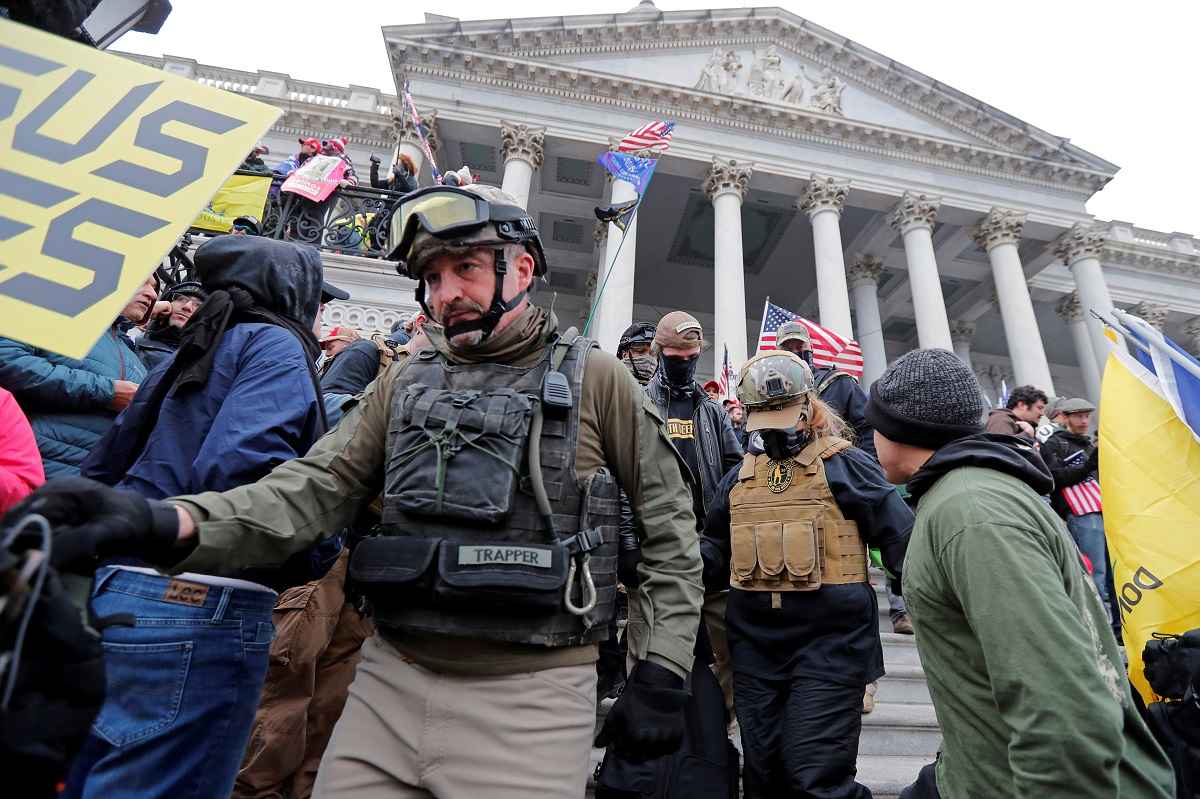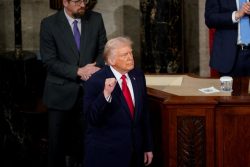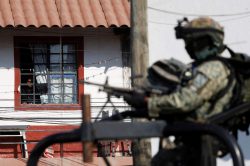
Members of the Oath Keepers are seen among supporters of U.S. President Donald Trump at the U.S. Capitol during a protest against the certification of the 2020 U.S. presidential election results by the U.S. Congress, in Washington, U.S., January 6, 2021.
16:30 JST, January 24, 2023
WASHINGTON (Reuters) – Four more members of the far-right Oath Keepers were found guilty on Monday of seditious conspiracy for taking part in the Jan. 6, 2021 assault on the U.S. Capitol by supporters of Donald Trump, in another big win for federal prosecutors.
The verdict marks the end of the second major sedition trial against members of the extremist group, who were among the hundreds who attacked the Capitol in an unsuccessful attempt to prevent Congress from certifying Democrat Joe Biden’s victory over Trump, a Republican, in the 2020 presidential election.
The 12-member jury found Oath Keeper members David Moerschel, Joseph Hackett, Roberto Minuta and Edward Vallejo guilty of seditious conspiracy.
All four were also found guilty of obstructing Congress from certifying the 2020 presidential election, and for two other conspiracy charges in connection with the Capitol attack.
Seditious conspiracy is a rarely prosecuted Civil War-era law that prohibits plotting to overthrow or destroy the government and carries up to 20 years in prison.
A jury found Oath Keepers founder Stewart Rhodes and another Florida-based leader of the group guilty of seditious conspiracy in a separate trial in November.
Three other members in that trial were found not guilty of that charge, but all five defendants were found guilty of obstructing Congress from certifying the election.
Prosecutors have brought criminal charges against more than 950 people following the riot. Four people died during the chaos, and five police officers died of various causes after the attack.
U.S. District Judge Amit Mehta split the Oath Keepers seditious conspiracy case into two separate trials due to space limitations and the risks of COVID-19 contagion.
In both trials, Rhodes’ fiery rhetoric and inflammatory statements about “civil war” and “bloody war” took center stage, with prosecutors saying the other members were inspired to carry out his vision.
A third seditious conspiracy trial against five members of the Proud Boys, another right-wing militant group, is ongoing.
Jurors heard testimony and evidence in the second Oath Keepers case for several weeks.
None of the four defendants played major leadership roles in the organization, and their attorneys have said there is no evidence they plotted to block certification of the election.
On the day of the attack, Moerschel, Hackett and Minuta all entered the Capitol clad in tactical gear.
Prosecutors said Minuta led a group of several Oath Keepers into the Capitol and clashed violently with police, all the while screaming it was “their building.”
STOP THE STEAL NONSENSE
Scott Weinberg, an attorney for Moerschel, told reporters he believes it may have been easier for the defendants if they had been tried in the same trial with Rhodes because it would have been easier to point to him as the “real bad guy.”
“Obviously, these men were swept up by the Stop the Steal nonsense that was pushed by the president,” Weinberg added. “When you follow somebody blindly, you end up in a terrible situation.”
Though all four defendants were found guilty of the most serious charges they faced, some were acquitted on others.
Jurors convicted Hackett of tampering with evidence, but acquitted him of destruction of federal property. Moerschel was acquitted on both charges, while Minuta was acquitted of tampering.
Vallejo was not charged with tampering or federal property destruction. He was accused of staying back at a hotel in Northern Virginia, where the Oath Keepers staged a “quick reaction force” that prosecutors said was equipped with firearms ready to be quickly transported into Washington.
All four men will be required to remain in home detention pending sentencing. Some are expected to appeal the verdict.
The trial featured testimony from law enforcement officials and several fellow Oath Keepers who had previously pleaded guilty to other crimes, who said they had acted to stop the vote count.
Top Articles in News Services
-

Survey Shows False Election Info Perceived as True
-

Hong Kong Ex-Publisher Jimmy Lai’s Sentence Raises International Outcry as China Defends It
-

Japan’s Nikkei Stock Average Touches 58,000 as Yen, Jgbs Rally on Election Fallout (UPDATE 1)
-

Japan’s Nikkei Stock Average Falls as US-Iran Tensions Unsettle Investors (UPDATE 1)
-

Trump Names Former Federal Reserve Governor Warsh as the Next Fed Chair, Replacing Powell
JN ACCESS RANKING
-

Producer Behind Pop Group XG Arrested for Cocaine Possession
-

Japan PM Takaichi’s Cabinet Resigns en Masse
-

Man Infected with Measles Reportedly Dined at Restaurant in Tokyo Station
-

Israeli Ambassador to Japan Speaks about Japan’s Role in the Reconstruction of Gaza
-

Videos Plagiarized, Reposted with False Subtitles Claiming ‘Ryukyu Belongs to China’; Anti-China False Information Also Posted in Japan


























